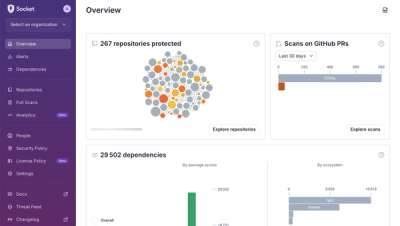
Research
wget to Wipeout: Malicious Go Modules Fetch Destructive Payload
Socket's research uncovers three dangerous Go modules that contain obfuscated disk-wiping malware, threatening complete data loss.
@open-wc/lit-helpers
Advanced tools
permalink: 'developing/lit-helpers.html' title: Lit Helpers section: guides tags:
A library with helpers functions for working with lit-html and lit-element
Part of Open Web Components: guides, tools and libraries for modern web development and web components
npm i --save @open-wc/lit-helpers
Spread directives can be used to set an arbitrary collection of properties, attributes or event listeners on an element without knowing all the keys in advance.
The spread directives work by taking in an object of data to spread. Because of lit-html syntax, we need one attribute to apply the directive to. It doesn't actually matter what the name of this attribute is, we recommend sticking to the convention of using ... as the attribute name.
The regular spread directive can be used to set properties, attribute or event listeners. It uses the same syntax as lit-html for distinguishing different types of bindings:
import { html, render } from 'lit-html';
import { spread } from '@open-wc/lit-helpers';
render(
html`
<div
...=${spread({
'my-attribute': 'foo',
'?my-boolean-attribute': true
'.myProperty': { foo: 'bar' },
'@my-event': () => console.log('my-event fired'),
})}
></div>
`,
document.body,
);
Because spreading properties is a common use case, you can use the spreadProps directive so that you don't need prefix each property with a .. This is especially useful when the data comes from external sources.
import { html, render } from 'lit-html';
import { spreadProps } from '@open-wc/lit-helpers';
render(html` <div ...="${spreadProps({ propertyA: 'a', propertyB: 'b' })}"></div> `, document.body);
Since spread already spreads attribute as the default case, we do not need a separate spreadAttributes directive.
When re-rendering, values are updated if they changed from the previous value. We use the same strict equality check (!==) as lit-html for this.
Unlike lit-html, when spreading attributes we remove the attribute if it is set to null or undefined.
If an entry in the spread data is removed, the property is set to undefined, the attribute is removed or the event listener is deregistered.
Example:
function renderSpread(data) {
render(html` <div ...="${spread(data)}"></div> `, document.body);
}
// result: <div foo="bar">
renderSpread({ foo: 'bar' });
// result: <div foo="buz">
renderSpread({ foo: 'buz' });
// result: <div foo="buz" lorem="ipsum">
renderSpread({ foo: 'buz', lorem: 'ipsum' });
// result: <div foo="buz">
renderSpread({ foo: 'buz' });
// result: <div>
renderSpread({ foo: 'undefined' });
For efficiency, lit-html does not set properties or attributes if they did not change since the previous render. This can cause problems when the properties are changed outside of lit-html's control. The live directive can be used to dirty check the element's live value, and set the property or attribute if it changed.
A great example for this, is the DOM element's scrollTop property which changes without lit-html knowing about it when the user scrolls.
By using the live directive, you can make sure it is always in sync with the value rendered by lit-html:
html` <my-element .scrollTop=${live(scrollTop)}></my-element> `;
ReadOnlyPropertiesMixin provides a way for based on LitElement (or it's parent class UpdatingElement) to define properties by adding readOnly: true to their property declaration. Those properties are read-only from the outside, but can be updated internally with the setReadOnlyProperties method.
import { ReadOnlyPropertiesMixin } from '@open-wc/lit-helpers';
import { LitElement } from 'lit-element';
class SettableElement extends ReadOnlyPropertiesMixin(LitElement) {
static get properties() {
return {
timestamp: { type: Number, readOnly: true },
};
}
constructor() {
super();
this.timestamp = Date.now();
}
updateTime() {
this.setReadOnlyProperties({ timestamp: Date.now() });
}
render() {
return html`
<button @click="${this.updateTime}">Update Time</button>
<time>${this.timestamp}</time>
`;
}
}
The mixin also supports the @property decorator.
import { ReadOnlyPropertiesMixin } from '@open-wc/lit-helpers';
import { LitElement, property } from 'lit-element';
class SettableElement extends ReadOnlyPropertiesMixin(LitElement) {
@property({ type: Number, readOnly: true }) timestamp = Date.now();
updateTime() {
this.setReadOnlyProperties({ timestamp: Date.now() });
}
render() {
return html`
<button @click="${this.updateTime}">Update Time</button>
<time>${this.timestamp}</time>
`;
}
}
Currently, this mixin only works properly when applied to LitElement (or UpdatingElement) directly. In other words, if you have a component which inherits like the example below, then ReadOnlyPropertiesMixin must be applied to LitElement only.
// Bad
class Lowest extends LitElement {
@property({ readOnly: true }) lowestProperty = undefined;
}
class Highest extends ReadOnlyPropertiesMixin(Lowest) {
// will not work as expected
@property({ readOnly: true }) highestProperty = undefined;
}
// Good
class Lowest extends ReadOnlyPropertiesMixin(LitElement) {
@property({ readOnly: true }) lowestProperty = undefined;
}
class Highest extends Lowest {
@property({ readOnly: true }) highestProperty = undefined;
}
Read only properties must be initialized with some value, even if the value is undefined. This is because the mixin allows one free setting, to support class field initialization.
// Bad
class Uninitialized extends ReadOnlyPropertiesMixin(LitElement) {
@property({ readOnly: true }) uninitialized;
}
// Good
class Initialized extends ReadOnlyPropertiesMixin(LitElement) {
@property({ readOnly: true }) initialized = undefined;
}
FAQs
Helpers and utils for lit-html and lit-element.
The npm package @open-wc/lit-helpers receives a total of 14,613 weekly downloads. As such, @open-wc/lit-helpers popularity was classified as popular.
We found that @open-wc/lit-helpers demonstrated a not healthy version release cadence and project activity because the last version was released a year ago. It has 4 open source maintainers collaborating on the project.
Did you know?

Socket for GitHub automatically highlights issues in each pull request and monitors the health of all your open source dependencies. Discover the contents of your packages and block harmful activity before you install or update your dependencies.

Research
Socket's research uncovers three dangerous Go modules that contain obfuscated disk-wiping malware, threatening complete data loss.

Research
Socket uncovers malicious packages on PyPI using Gmail's SMTP protocol for command and control (C2) to exfiltrate data and execute commands.

Product
We redesigned Socket's first logged-in page to display rich and insightful visualizations about your repositories protected against supply chain threats.